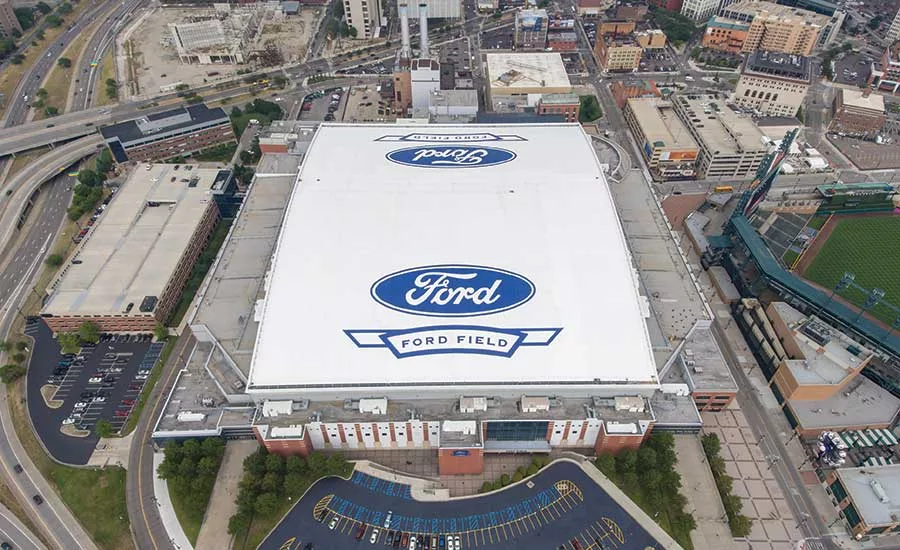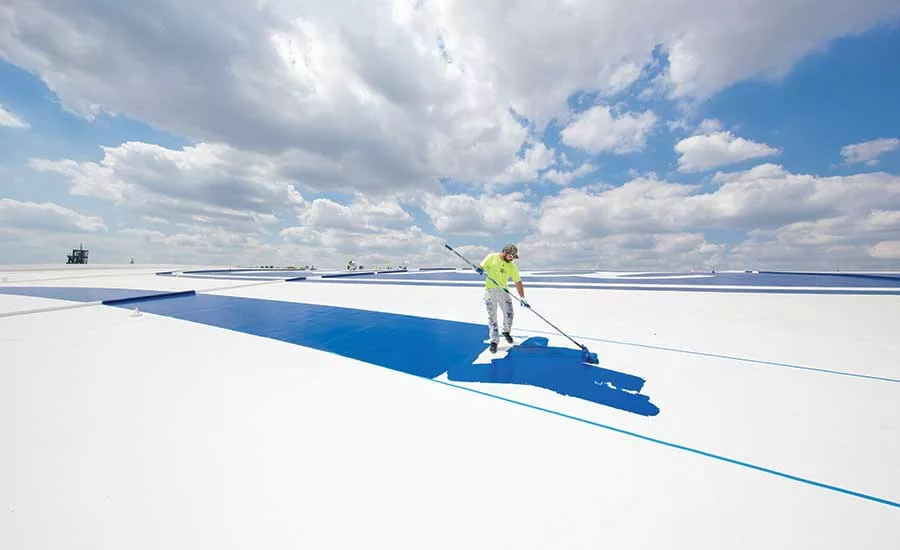Tremco Finds the Solution at Detroit's Ford Field in Time for a Memorable Football Season
Case Study: Defending the Den

Photos courtesy of Tremco.

Photos courtesy of Tremco.

Photos courtesy of Tremco.
The Detroit Lions were among the handful of teams in contention for a division title and a guaranteed spot in the National Football League playoffs in 2016, and it’s largely due to their performance at home.
The Lions finished an impressive 6-2 at Ford Field and were just a few big plays short of its first division crown since 1993 and a seventh win at home for just the fifth time in the franchise’s eight-decade history. And none of it would’ve been possible without critical repairs to the Ford Field roof over the summer. Repairs that kept the moisture out, and the energy inside during each of the team’s thrilling come-from-behind victories.
The Problem
Built in 2002 for $430 million, Ford Field has become a vital mix-use facility for the upper Midwest that’s hosted multiple major sporting events — including the 2009 NCAA Final Four and Super Bowl XL. In recent years, it’s also served as a destination venue for some of the biggest entertainment stars around the world ranging from the Rolling Stones to Beyoncé.
With a seating capacity that exceeds 70,000 people, it immediately became the new home of the Lions, who for the majority of two decades wallowed in mediocrity while playing in the now decrepit (and coincidentally roof-less) Pontiac Silverdome. Coupled with Comerica Park — home of the Detroit Tigers — next door, the stadium helped mark the beginning of the core city’s latest renaissance, which still continues despite political turmoil and an unprecedented, historic bankruptcy.
Though only 14 years old, Ford Field’s 340,000 square-foot domed roof began to show signs of age and weathering under Michigan’s harsh, cold winters and muggy, sun-soaked summers. Moisture had already caused some damage to the insulation underneath a small portion of the roof and there was a greater potential for leaks if left untreated, according to a formal inspection provided by Tremco Roofing and Building Maintenance in 2015.
The Team
Led by Senior Field Advisor James Getzen, the Tremco team recommended its fully-reinforced, two-coat AlphaGuard™ BIO system to restore the roof. Restoration is much more sustainable than replacement because the existing roof membrane is significantly upgraded, not torn off and sent to landfills. This long-term approach to extending the life of the roof, instead of replacing it, delivers maximum value with a significant reduction in cost.
The roof restoration was also part of a larger investment to increase the facility’s energy efficiency and sustainability.
“Using Tremco Roofing’s diagnostics services, we thoroughly analyzed the roof and found areas with ongoing leaks that resulted in moisture-laden insulation,” Getzen said. “Fortunately after 14 years, the roof was in relatively good shape. Restoration is much more sustainable than replacement; material is not torn off and sent to landfills. It’s also more economical because it extends a good roof’s life. The highly reflective, white AlphaGuard BIO system should help reduce energy use as it absorbs very little heat.”
The AlphaGuard BIO system is also earning a reputation for easy application and quick-curing characteristics in highly-sensitive projects, such as in-use entertainment facilities. Crews from Schreiber Corporation of Wixom, Mich., — a Tremco Platinum Contractor — installed the fluid-applied system.
The base coat was installed in concert with a prefabricated polyester reinforcement, followed by the AlphaGuard BIO top coat. Schreiber completed the installation within 60 work days. A much more suitable timeline for the Lions than the projected nine months it would’ve taken to completely replace the roof.
“Tremco Roofing provided a solution that was the right fit for the roof renovation process at Ford Field,” said Detroit Lions Vice President of Operations Todd Argust. “Their cost effective and sustainability-focused approach enabled us to spend wisely on a solution that provides protection while minimizing material ending up in a landfill. We will continue to work with them on a maintenance program to ensure our roof will perform well and look great for years to come. The extension of our relationship with Tremco Roofing is a mutually beneficial partnership supporting the longevity of Ford Field.”
A Winning Feel
Creating a home field advantage for the season wasn’t without challenges. The Ford Field roof renovation was a massive project that required very complex staging of both material and manpower from Tremco, the Lions and the roofing crews.
Work started in July, and crews often spent 10-hour days prepping and making repairs in order to have the building game-ready for the NFL pre-season. It took an entire day for a helicopter to make the 160 deliveries needed to move materials to the rooftop — including hundreds of 50-gallon drums of product.
In addition to repairing the damaged membrane and insulation, crews thoroughly cleaned the roof surface with the RoofTec™ cleaning system, and repainted the iconic Ford oval logo and field name in the company’s custom Ford blue. They also installed non-skip walkways along the parapet walls and edges to improve safety.
Though company officials declined to comment on the cost of the restoration project, it was on budget and completed well in time for the opening kickoff of one of the Lions’ most successful home seasons in years.
That was enough to earn repeat business. Shortly after completion, the Lions named Tremco Roofing and Building Maintenance as the team’s official roofing supplier. The team also has a practice facility in nearby Allen Park, but no other roofing projects have been identified yet.
“We’re very proud that the Lions chose Tremco Roofing, not just to restore Ford Field’s roof but also to make the stadium more sustainable,” Getzen said upon the project’s completion. “We look forward to continuing our relationship with the Lions, and of course to a great season.”
Indeed it was for Lions fans that seldom have much to cheer about as the NFL regular season came to a close.
Information provided by Tremco Roofing and Building Maintenance was used for this article.
Looking for a reprint of this article?
From high-res PDFs to custom plaques, order your copy today!







